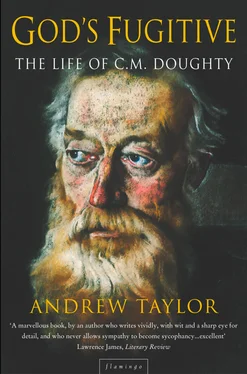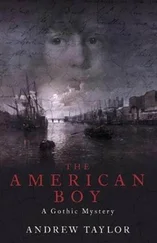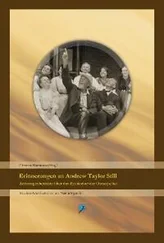The circular foundations remain – the bottom of a pillar, or stonework cemented in the midst of the passage of so many centuries – not buried under falling sand, but remains as at the first!!! Desert of black sand and water – 4 or 5 poor plants. The way all a waste of sand and lavas – with many wild craters on either hand …
Like the rest of the notebook, they are, of course, merely rough jottings. But, especially when compared with the bland, conventional judgements Doughty makes about towns and architecture, it is impossible to miss the enthusiasm with which he turns to the immensity either of time or of open spaces – the huge shadow of Etna or the centuries of history of the stone foundations. As a writer and as a traveller, his mental horizons are vast, his sense of time almost geological in its scope. It is the sight of human creativity and endeavour set against a background of desolation which suddenly brings his imagination to life.
His enthusiasm is sparked by ruins and remains, by the thought that buildings – or, for that matter, languages or peoples – may still bear some relation to the way they were hundreds of years ago. It is a conventional enough romantic response – half a century before, Shelley had described how ‘Two vast and trunkless legs of stone / Stand in the desert’ – all that remained of the magnificent statue of the proud King Ozymandias. Had Doughty been the ‘traveller from an antique land’ in Shelley’s poem, his description of the statue might have stressed the same sense of hubris in the dead king, and the same all-pervading bleakness in the landscape. But there is nothing to suggest that Doughty had ever paid any attention to Shelley or any other romantic writers; this is his own emotional response. Conventional as it may be, it is one of the first signs of genuine interest or involvement in his travelling.
In his observation of the people whom he met, his broader judgements and generalizations are often almost comical in their smug dismissiveness. But occasionally, his notes pick out the minutiae of habits or behaviour with a precision that can bring individuals to life like the detail of a Brueghel painting. ‘The countryman’s salutation “Benedici”, their feet in sandals or unshod. The Sicilian curiously daubed carts, with saints and Bible stories. The Sicilians ride on a pack saddle without stirrups ( staffe ).’ The eye roves over the peasants as they go by, registering specific points apparently at random, seeming to note their friendliness and devout Christianity almost in passing. But each individual item is significant – the religious greeting, the biblical paintings on their wagons, their humble way of travelling around. And while Doughty determinedly remains an outsider – the carts are ‘curiously’ daubed – the pedantic little Italian translation shows how his appreciation of the people will grow through his observations, and also through an understanding of their language. It was the same painstaking, word-by-word linguistic technique which had led him to pore over Latin and Anglo-Saxon grammars in the Bodleian, and which would later see him quizzing his Arab companions about the exact distinctions between different Arabic expressions.
By now the winter was drawing in, the weather ‘rough and uncertain’, and Doughty was giving up hope of finding suitable accommodation on the island to see him through the winter. His initial plan had been to take a passage to Spain, but, failing to find a direct service, he decided to explore Malta instead, travelling by boat to Syracuse, where he would join the ferry for Valetta. For a gentleman traveller, the winter storms were a nuisance; for the impoverished local fishermen, they could be disastrous. ‘Took up two fishermen and a boy whose boat was overturned after a storm of rain and wind one hour before. They were sitting in their boat which was full of water ten miles from the shore. Syracuse at 3.30 p.m.…’
Once again, the casual telling of the story seems disturbingly uninvolved. It is Doughty at his most detached, as apparently uncaring about the plight of the fishermen as he had been about the villagers on the slopes of Mount Vesuvius. In the descriptions he wrote of Vesuvius, he had at least the excuse that he was looking back from a distance of several years on the disaster; here, his notes written down almost as the three bedraggled sailors were taken aboard show merely the curiosity of a tourist looking at a picture. There is not a spark of human sympathy. It is almost as if Doughty feels he has mentally set off for the next stage of his travels, and wants nothing more to do with Sicily or its people: ‘Rowed on board at 10 p.m. in a storm of rain and lightning. Thick weather. Steamed out of harbour towards midnight …’
Presumably there was still no passage to be had to Spain, because what Doughty found in Malta was a ferry to North Africa, a small Glasgow steamship that would take him to the Tunisian port of Goletta. His initial impressions here were as bad as those of Valetta had been encouraging. ‘A large filthy village’ was his brisk summary of Goletta itself, while Sidi bu Said, where the nearby site of ancient Carthage might have been more to his taste, was dealt with even more contemptuously. ‘A confused, rank, open, unprofitable, uncultivated and miserable territorium, scarcely credible ever to have been any good site, or that ever any great city was built there – much less Carthage …’
There is a surprising casualness about Doughty’s dismissal of the scene of one of the great cities of the ancient world – though the Romans, of course, had left little of Carthage standing for future archaeologists. But in a sense, this is a fitting farewell to the culture of Europe and the Mediterranean: he had left Europe, at least for a short while, and here in North Africa he was to find not only his introduction to the Arab world, but also the real impetus to his imagination.
It was in the French colonial town of Constantine, a four-and-a-half-hour train journey from the coast, that Doughty had his first direct encounter with the Muslim religion. It was Ramadan, but there seems to have been no difficulty in gaining entrance to the main mosque – and no sign, either, of the antipathy Doughty would show later for Islam and all its works.
A basilica with 4 or 5 rows of pillars, roof flat, floor covered with Brussels carpets … Lighted with candles in handsome chandeliers, with worshippers sitting against the columns reading the prayers and service on certain leaves of parchment. Others prostrated themselves on the earth, with their foreheads touching the ground.
For a traveller leaving Europe for the first time, even for one as determinedly unimpressed as Doughty, it was an irresistibly exotic tableau – but it was also an image of a native Arab culture that was, in Algeria in the year 1872, struggling to survive. For several years the fellahin had faced a succession of natural disasters – epidemics, crop failures and infestations of locusts – but in 1871, heartened by the defeat of the French armies in Europe, some 800,000 of them had joined a holy war aimed at driving out the colonists who ruled them. It had been a savage but hopeless fight, with farms and villages laid waste by rebels and French soldiers in turn. The end was never in doubt. The leaders of the insurrection were killed or captured, and many of them put on trial as criminals before juries packed with French immigrants.
Elsewhere in the Middle East French, English and Russians nurtured their own ambitions as the moribund Ottoman empire faltered, And in another sense, too, North Africa, Arabia and the Islamic world were under attack. 13 Whatever the ambitions of the politicians, Europe’s writers, poets and artists had effectively colonized the Orient for themselves already, and the scene Doughty saw in the Constantine mosque would have been familiar to Victorian England from the paintings and writings about the East that had been fashionable for years. There had been a flood of poems, paintings, novels and fantasies set in a self-consciously Middle Eastern and desert world. By mid century travellers to Arabia were visiting a land and a culture that was fascinatingly strange and different from their own – but one that must at least have seemed, to anyone with even a nodding acquaintance with contemporary thought, reassuringly familiar.
Читать дальше












